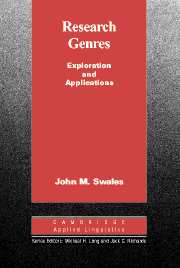Book contents
- Frontmatter
- Contents
- Series editors' preface
- Acknowledgments
- Chapter 1 Toward a world of genre
- Chapter 2 The role of English in the research world
- Chapter 3 Theoretical and methodological issues
- Chapter 4 “Getting done”: The Ph.D. dissertation
- Chapter 5 The Ph.D. defense
- Chapter 6 Research talk and research talks
- Chapter 7 The research article revisited
- Chapter 8 Three remaining issues
- Appendix
- Notes
- References
- Author index
- Subject index
Chapter 3 - Theoretical and methodological issues
Published online by Cambridge University Press: 05 October 2012
- Frontmatter
- Contents
- Series editors' preface
- Acknowledgments
- Chapter 1 Toward a world of genre
- Chapter 2 The role of English in the research world
- Chapter 3 Theoretical and methodological issues
- Chapter 4 “Getting done”: The Ph.D. dissertation
- Chapter 5 The Ph.D. defense
- Chapter 6 Research talk and research talks
- Chapter 7 The research article revisited
- Chapter 8 Three remaining issues
- Appendix
- Notes
- References
- Author index
- Subject index
Summary
In this chapter, I explore a number of more theoretical issues that have in recent years somewhat complicated any attempts at an applied genre analysis, whether directed at the academy, the corporate world, the health professions, governments, or even the law. In so doing, however, I will hold to a practitioner orientation – if at times at quite long range and at others somewhat precariously. In other words, I will be searching for a position that, on the one hand, engages as far as necessary with genre theory, while, on the other, protects applied discourse analysts from particularly complex or distant sources of theory construction so that their arriving at workable solutions to real-world problems is not unreasonably delayed or placed in other kinds of jeopardy.
I suggest that a large part of the way forward in this pragmatic approach is to take the view that theory and methodology represent not so much separate epistemological worlds as mirror images of the same enterprise – that of making useful discoveries. In this way, theory turns out to be what we need to shape and inform our methodologically derived observations and interpretations, while the methodological options that emerge modify the theoretical positioning that we started with. Theory, then, can best be seen as what we need to frame a viable piece of action research, rather than being a body of reflections and perplexities that may hold up investigative endeavors.
Information
- Type
- Chapter
- Information
- Research GenresExplorations and Applications, pp. 60 - 98Publisher: Cambridge University PressPrint publication year: 2004
